An interesting event took place on July 18: representatives of 5 Armenian NGOs met with Turkish Foreign Minister Ahmet Davutoglu.
The visit to Ankara was organized within “Guide to confidence and reconciliation: more stable and productive Armenian-Turkish regional cooperation” program implemented by TEPAV organization, which is financed by GMF’s Black Sea Trust. Initially, the meeting was scheduled to be held on June 18 but for various reasons it was put off till July. In fact, it was a surprise for the Armenian group, which arrived in Turkey July 17 to participate in concrete events which had been previously agreed. However, in the evening of July 18 the program changed. We were told that we were going to meet Mr. Davutoglu.
Although it was a surprise, but being representatives of the Armenian civil society, it would be wrong to miss the chance to outline our views and positions. And we set off to Turkish Foreign Ministry. We were first met by Deputy Foreign Minister Sinirlioglu and then - the Minister himself.
During the meeting, the Turkish side eventually said nothing new. They told us in detail that they had changed and wished the circumstances allowed them to make a few more steps forward tomorrow. Well, the list of Turkey’s preconditions is well known. Wishing to be polite we had to listen to their viewpoint once again, this time in a freer atmosphere. Moreover, we were given a chance to get to know the new arguments of the Turkish side.
Davutoglu expressed himself in a very interesting way. However, one thing was obvious: the Turkish Foreign Ministry aims to present some process, and in conditions when there are no real interstate talks any meeting is a good opportunity to show to the international community that there is indeed a process, a movement going on.
Some pressure did exist: on her visit to Turkey a few hours ago, during all her meetings Hillary Clinton confirmed that the USA also expected Turkey to fulfill all its commitments, i.e. improvement of Armenian-Turkish relations by ratifying the Zurich protocols. Clinton's pressure probably forced the Turkish Foreign Minister to find time in his most busy agenda to meet with the Armenians who accidentally happened to be in Ankara at that time. But there was another serious issue as well: Turkish officials were also interested and wanted to understand the opinion of the Armenian society on the issue. In this regard, a perhaps a very serious viewpoint, which had not been voiced before, was presented: “Armenian patience is not endless”. It seems that many people agree with the idea that Armenia will toughen its positions due to forthcoming elections.
But I added that before May 2012, there is one more symbolic and perhaps even more powerful event that may toughen Armenia’s positions. I mean the twentieth anniversary of Armenia's independence. Naturally, at that time political statements on Armenia's achievements will be also made, and all this is likely to be used against Turkey for the sake of gaining electorate and toughening positions. And if the Turkish side really wants to benefit from the best chance, it should hurry and realize the forecasts about the alleged ratification of the protocols after June elections.
Apart from political discussion, the conversation proved to be quite normal due to personal stories of the both sides. This once again proved that in the reality Turkey has a great desire to outline all the changes, which have taken place in their positions, as well as to comprehend the transformation necessary for the future of their country to be able to have normal relations with neighbors and create a peaceful region. Learning Minister Davutoglu’s this vision, I proposed that this viewpoint may and should be best presented in Armenia by the Turkish Ambassador Extraordinary and Plenipotentiary. For this very reason Turkey should take the lead and ratify the protocols as soon as possible and establish diplomatic relations with Armenia. So, let’s see whether Minister Davutoglu’s final idea - “I hope that all this will be realized in the shortest possible time” - will comply with the reality or not.
Tevan Poghosyan is the Executive Director of International Center for Human Development (ICHD). These views are his own.

















Comments
Dear visitors, You can place your opinion on the material using your Facebook account. Please, be polite and follow our simple rules: you are not allowed to make off - topic comments, place advertisements, use abusive and filthy language. The editorial staff reserves the right to moderate and delete comments in case of breach of the rules.